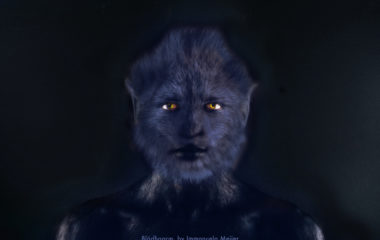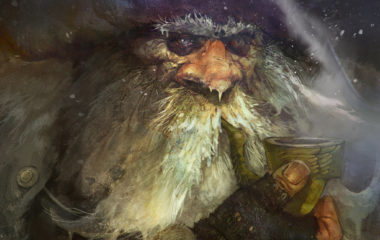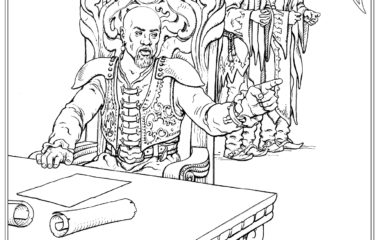Elva was orphaned as a baby. Perhaps her parents traveled with the Varden to Tronjheim and died, or her caretaker, Greta, transported Elva to the dwarves’ capital following their deaths. In any case, when Eragon visited the secret stronghold, Greta pushed through the crowd to ask him to bless the child for luck, which he did:
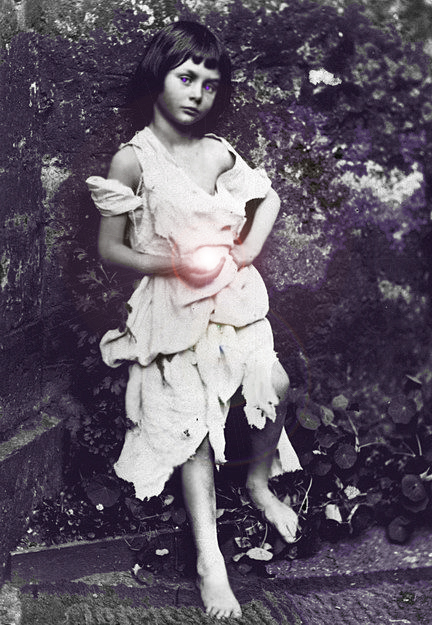
Atra guliä un ilian tauthr ono un atra ono waíse skölir fra rauthr.
Saphira also gave Elva a gift, one of hope; the dragon brushed her snout along the child’s forehead and left a silver/white star-shaped mark, much like a Dragon Rider’s gëdwey ignasia.
Neither Eragon or Saphira thought any further of Elva until their training in Ellesméra. Eragon realized he had made a grammar error during the blessing and instead of saying “May luck and happiness follow you and may you be shielded from misfortune,” he had cursed her with “May luck and happiness follow you and may you be a shield from misfortune.” The effects from this mistake, though not immediately clear, were permanent.
*(Christopher Paolini made the grammar error, which he didn’t catch until when he was writing Eldest. He decided to incorporate the error into the story line and the character arc of Elva was born.)*
The Varden eventually mounted a direct attack on the Empire, following the Battle of Farthen Dûr. The resistance relocated to Surda, where King Orrin gave Greta and Elva rooms on the west side of Borromeo Castle in Aberon. Solembum and Angela noticed something odd about the baby. . . she now appeared to be a girl of about four, despite only weeks having passed since Eragon’s blessing. Nasuada was summoned to investigate.
Elva, her eyes now a vivid shade of violet (the same color as the Helgrind priests’ crystals), explained that she had learned to speak the prior week in order to talk with the Varden leader. Eragon’s magic enabled Elva to sense all of the current and upcoming troubles of the people she encountered and compelled her to come to their aid—regardless of the harm it might cause her or whether she wanted to or not; any attempt to resist its influence caused her to suffer. As an infant, it was not physically possible to assist those in need, and so she grew, consuming a lot of food to fuel the changes. (Her rations were increased to keep up with her appetite.) Elva wanted the war to end for obvious reasons, so she offered her services to Nasuada. Her ability to foretell what would happen to an individual or group was limited to three hours prior, at most. Because she could sense exactly what pained others—physical, metal, or emotional—Elva knew precisely what to say or do to sooth those pains. The downside to this was that she needed to stay indoors in order to protect herself from forcibly sacrificing herself for another. The only person, perhaps in all of Alagaësia, that Elva could not read was Angela, and the herbalist was not sharing the secret of how she accomplished this with anyone else.

The Varden leader left to discuss the situation with Angela, who promised to keep an eye on the girl, especially because it was not clear whether or not Elva would be a force for good. The herbalist had been unable to read the girl’s future with dragon knucklebones because of how many lives Elva would affect.
Nasuada was indecisive about taking Elva into her service, but a short time later Elva sensed that an assassin would successfully kill the leader if nothing was done to prevent it. In order to escape her room, she told Greta what she needed to hear and then rushed through Borromeo Castle, slicing the attendant guards’ legs with numerous small cuts in order to reach Nasuada. Elva knocked her to the ground just in time to save her life. In between rounds of vomiting, Elva explained where to find the Black Hand hit man and detailed his motivations. From then on, Elva was often with Nasuada, though it was an uneasy alliance much of the time.
Elva witnessed truly historic events, such as the alliance with the Urgals, during her time with the leader. Her mere presence also dissuaded trouble. Nasuada would bring Elva to meetings with the Varden’s Council of Elders, mainly because Nasuada knew that the girl’s presence would unnerve the council members. In fact, barring Angela, adults were generally uncomfortable around the changeling and children shunned her. Perhaps she could count the herbalist and Solembum as her only friends.
Eragon and Saphira returned from their training in Ellesméra to rejoin the main force of the resistance. When they first encountered Elva, Eragon asked for her forgiveness, and while she said that she forgave him, her bitterness was undeniable:
“You have condemned me to be aware of all the suffering around me. Even now your spell drives me to rush to the aid of a man not three tents away who just cut his hand, to help the young flag carrier who broke his left index finger in the spokes of a wagon wheel, and to help countless others who have been or are about to be hurt. It costs me dearly to resist those urges, and even more if I consciously cause someone discomfort, as I do by saying this. . . . I cannot even sleep at night for the strength of my compulsion. That is your legacy, O Rider.” (Deluxe edition Eldest, page 589)
Eragon explained that it was possible he could undo the spell and insisted that he try immediately, but Elva knew her skills would be useful in the upcoming Battle of the Burning Plains. She told him to save his energy for the fighting and if the Varden won, he could attempt to lift her curse.

The resistance did win. Shortly after, Nasuada was challenged by Fadawar for leadership of the Varden; the outcome would be decided in a Trial of the Long Knives. Elva knew that Nasuada would fail on the seventh cut, so she told Nasuada what she needed to hear: that she would prevail. Afterward, the reconfirmed leader thanked Elva for her prediction, though she was uncomfortable when she later found out that Elva had lied and that the fib was the only reason she won the contest.
Elva’s rapid growth continued, at least for a while. Nasuada noticed that the child now appeared closer to six years old, though she wasn’t even two. The skills Elva honed were not just limited to sensing pain. For example, when Blödhgarm consulted with Nasuada, the elf exuded a powerful pheromone that affected nearby females. Elva advised the Varden leader to think of horehound candy; the memory of the bitter flavor helped dispel the effects of the musk.
It finally came time for Eragon to attempt to remove the curse. Nasuada tried to convince Elva to keep it in order to continue helping the Varden, but the girl could not be convinced—she had suffered enough during her short lifetime.
Eragon offered two options to break the curse:
- He could use the ancient language to withdraw/unsay the words and intention of the original spell. This method was risky because if another error were made, the original would only be altered and there would now be two intertwined spells to remove. It could very well leave her worse off than before.
- He could cast a spell to directly counteract the effects of the curse, effectively nullifying one with the other. The drawback would be that the small amount of energy for the second enchantment would be continuously drawn from Elva for the rest of her life. Eragon could not be the source for this energy because if he traveled a mile or so from her, the effort of sustaining the spell from a distance would kill him, leaving her once more vulnerable to the original curse. The only risk to this method would be that he would have to cast another counter spell if he didn’t successful block all of the original enchantment.
Elva chose the second option. Initially, it didn’t seem to work, but gradually she realized that while she could still feel the pain of others, she could ignore most of it and was no longer compelled to act. When Eragon wanted to try another counter spell, Elva refused. She knew she would always be different, but at least now she could be different by choice. Her first decision was to dismiss Greta, who still treated the girl like a child, and assert that no one could tell her what to do ever again. She followed her declaration with a dramatic exit.
Just prior to the Battle of Jiet River, Angela had to sedate Elva until the fighting concluded as she was nearly incoherent with the pain that would soon be inflicted on many. Fortunately, she could also recover relatively quickly.
The witch-child’s relationship with Eragon continued to be problematic. One of the refugees from Carvahall, Elain, gave birth to a baby suffering from a cleft palate. Eragon was asked to heal the infant and Elva made sure she was there to serve as a warning that should he cause the child harm, Elva would be his sworn enemy. Fortunately, baby Hope was perfectly healed.
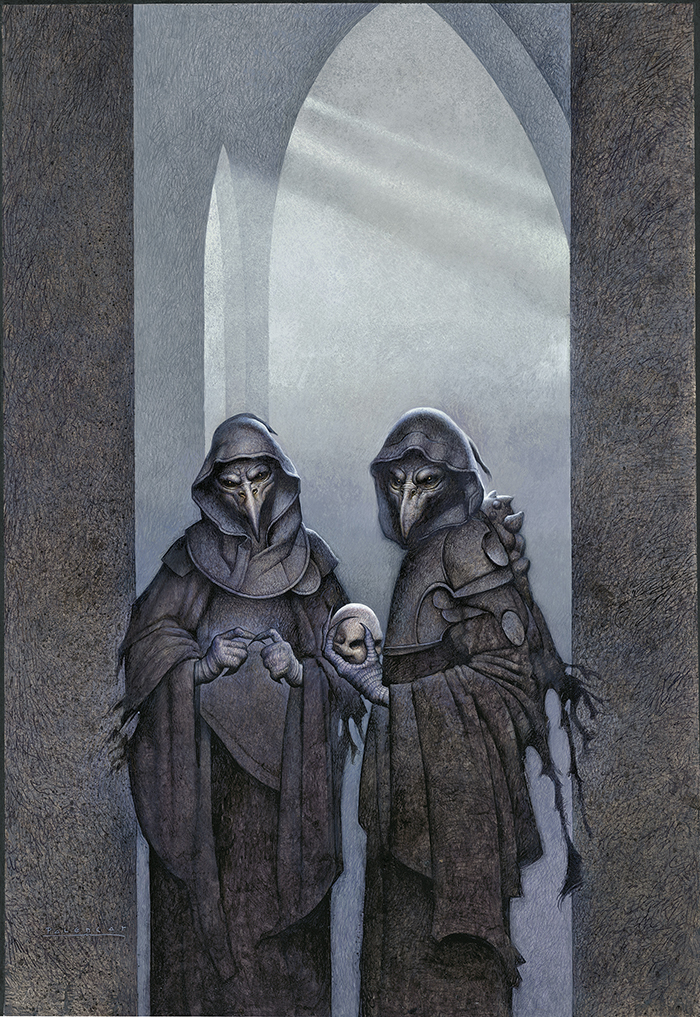
The Varden made their way through the Empire, successfully conquering many of Galbatorix’s major strongholds. Elva refused to join Eragon and his group while they infiltrated Dras-Leona. No matter how much he argued, she laughed in his face and would not come. Even Saphira could not change her mind. And so, because she would not help Eragon, Wyrden died during the mission.
After the battle, Eragon sought out Elva, determined to have his say. She was with Greta. (While readers aren’t privy to how she reconnected with her caretaker, perhaps she had regretted releasing the old woman from her service.) Eragon got straight to the point. If she wanted the Varden to lose, then she should just join Galbatorix and be done with it. If there was any other incident in which Elva refused to aid the Varden out of spite or anger, Eragon would deal with her and it would likely not go well for the girl. Elva apologized and genuinely regretted her actions, but Eragon said that it wouldn’t bring Wyrden back. All she could do was make better choices in the future.
Elva could not participate in battle in normal ways, nor should she have. When Murtagh, Thorn, and a group of soldiers invaded the Varden camp to kidnap Nasuada. The girl, despite feeling ill from the pain of the skirmish, was able to neutralize twelve of the soldiers on her own. Eragon observed her skill:
“…she was speaking rapidly to them, her small mouth moving in a blur. As she spoke, each man reacted differently: one stood fixed in place, seemingly unable to move; one cringed and covered his face with his hands; one knelt and stabbed himself in the chest with a long dagger; another flung down his weapons and ran off through the camp; and still another babbled like a fool. None lifted their swords against her, and none went on to attack anyone else.” (Deluxe edition Inheritance, page 353)
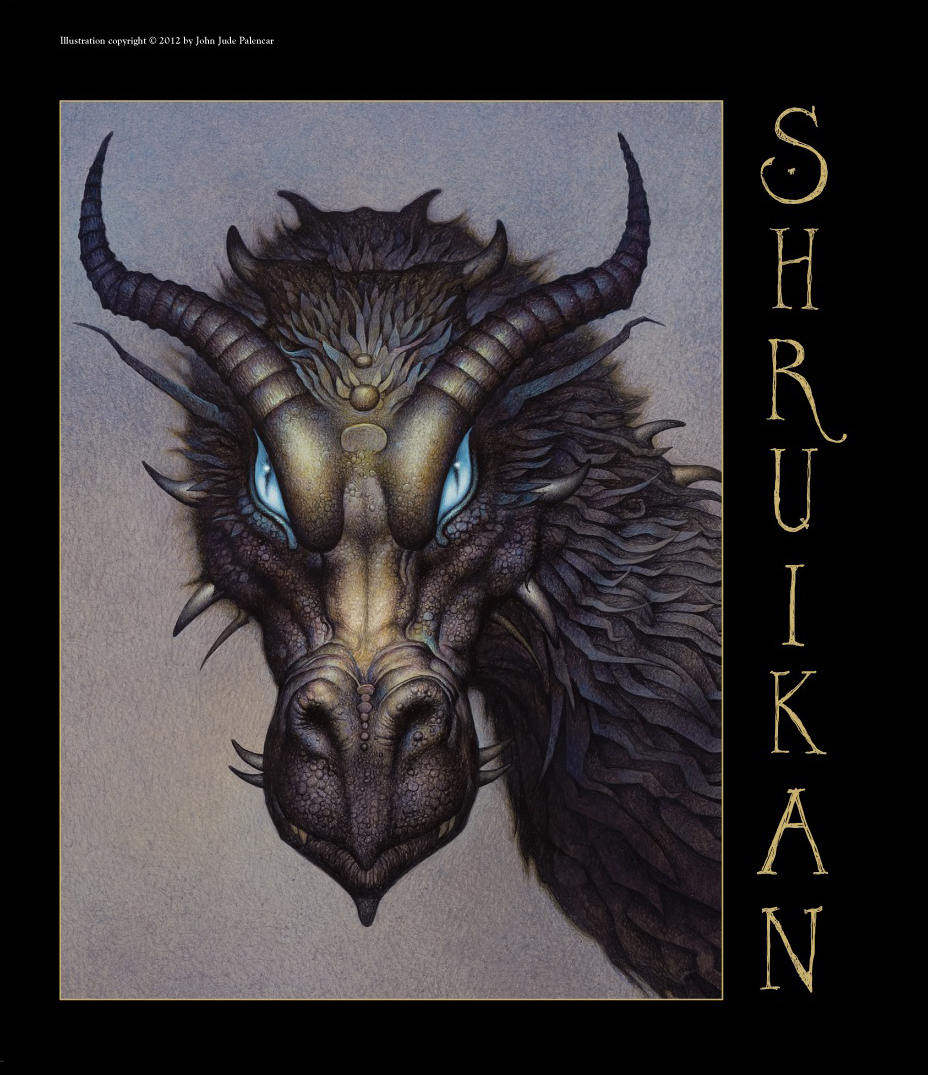
Despite Nasuada’s capture, the Varden and elven forces were finally able to converge before Urû’baen. Shruikan flew overhead and Elva sensed his suffering and the resulting irreparable madness. Nothing could be done for the dragon. Eragon asked Elva to join his infiltration party once more and this time she accepted, with Greta’s grudging consent. As they prepared, Elva intuited the secret weapon the Rider was hiding: Eldunarí from the Vault of Souls. She spent a night talking with the Eldunarí, at times charming them and always inspiring caution. For the excursion, she talked two dwarves into fashioning her a proper-sized hauberk.
Finally the group of adventurers were ready to invade the capital. The initial plan was for Eragon and Elva to invisibly fly with Saphira, Arya, Blödhgarm, and the other elven spellcasters to the citadel (while the main Varden forces attacked at the city gates). Galbatorix’s magic was too effective and their illusion was stripped before they could make it all the way. Nonetheless, they were able to pierce the walls guarding the palace using the protective properties of Niernen, and they finally arrived in the main hall before the throne room. The passage was booby-trapped.
Elva guided the group past hidden pits, falling blocks, and floor spikes. Twenty Empire magicians intercepted the adventurers’ path, but Eragon swiftly took care of the problem by slamming his hand on the ground to activate the trap the magicians stood over. Blades from the walls made quick work of the magicians. Saphira thought it would be safe to leap over the trigger plates, but Elva explained that there was another trigger point in the air and that if the dragon jumped she would be killed. Finally the elven spellweavers volunteered their swords to wedge the blades into the wall. The swords held for a short time, but Elva shouted for the group to run faster, otherwise they would all die except for Blödhgarm. Finally they stood in front of the throne room doors. Before they could enter, Blödhgarm and his ten remaining spellweavers were harmlessly transported away, leaving only Eragon, Saphira, Arya, Elva, and the Vault Eldunarí to face the tyrant king.
Galbatorix quickly immobilized and muted the small group standing before him. Even Elva was powerless to stop it, much less exert her influence on him. The confrontation continued with no real hope until finally Murtagh, who had entered the throne room with Thorn, was able to strip some of Galbatorix’s wards by using the name of names on the king. (Murtagh and Thorn had finally realized their true identities had changed through Murtagh’s love for Nasuada and so were able to cast off their oaths to Galbatorix.) It still didn’t appear to be enough. Finally, Eragon cast a wordless spell with the assistance of the Vault Eldunarí that forced the king to feel all the emotions he had caused others to experience due to his actions—to understand what he had done.
Even as Galbatorix was inundated with emotions, he still managed to exchange sword blows with Eragon, one of which would have killed the young Rider if Elva hadn’t warned him. Galbatorix could not bear the pain any longer and committed suicide by converting the energy in his body into an atomic explosion. Elva fainted.
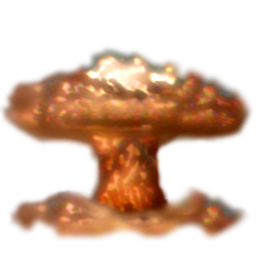
Eragon protected her while she was unconscious, and by the time she awoke, the war was won. Nasuada was soon crowned queen and began rebuilding the well-being of the land. Eragon, with the knowledge of the name of names, now knew how to remove Elva’s curse completely. She thought about it for nearly an hour and then decided:
“No. I would rather stay as I am. . . . I am grateful that you thought to ask, but this is too large a part of me, and I cannot give it up. Without my ability to sense others’ pain, I would be only an oddity—a misbegotten aberration, good for nothing but satisfying the low-minded curiosity of those who consented to have me around, of those who tolerated me. With it, I am still an oddity, but I can be useful as well, and I have a power that others fear and a control over my own destiny, which many of my sex do not.” She gestured at the ornate room where she was staying. “Here I can live in comfort—I can live in peace—and yet I can continue to do some good by helping Nasuada. If you take away my ability, then what would I have? What would I do? What would I be? To remove your spell would be no blessing, Eragon. No, I will stay as I am, and I will bear the trials of my gift of my own free will. But I do thank you.” (Deluxe edition Inheritance, pages 773-774)
Elva remained in Nasuada’s service, stopping three more assassination attempts. The witch-child also soothed Nasuada’s trauma that had resulted from her torture in Urû’baen. Only Angela and those who knew the name of names or knew how to mute Elva’s voice or deafen their own ears were impervious to Elva’s influence. Many still didn’t trust the girl, but whether or not she had negative intentions, she was there to stay by Nasuada’s side.
Like this article? Check out other Encyclopedia Alagaësia essays here!


